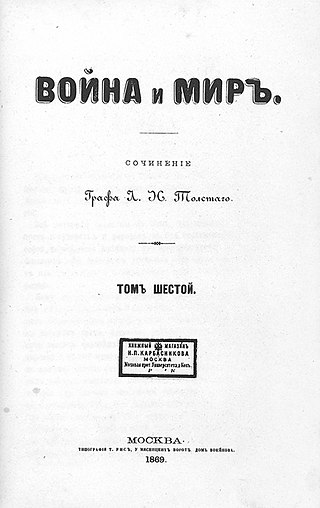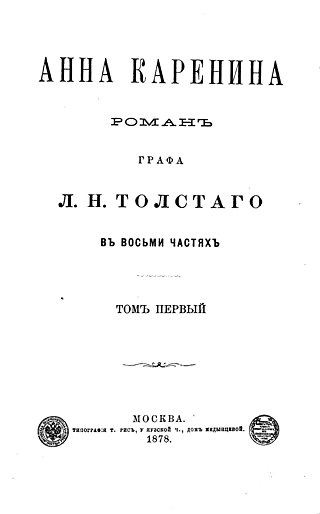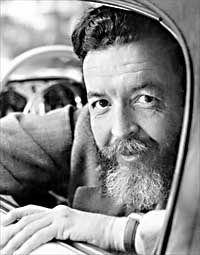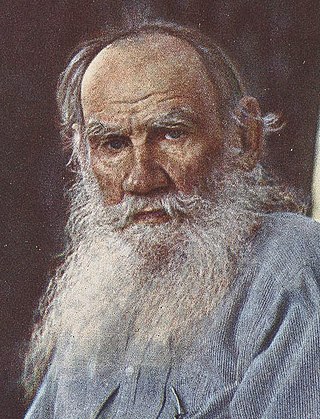Related Research Articles

The House of Tolstoy, or Tolstoi, is a family of Russian gentry that acceded to the high aristocracy of the Russian Empire. The name Tolstoy is itself derived from the Russian adjective tolstyj. They are the descendants of Andrey Kharitonovich Tolstoy, who moved from Chernigov to Moscow and served under Vasily II of Moscow in the 15th century. The "wild Tolstoys", as they were known in the high society of Imperial Russia, have left a lasting legacy in Russian politics, military history, literature, and fine arts.

War and Peace is a literary work by the Russian author Lev Tolstoy. Set during the Napoleonic Wars, the work comprises both a fictional narrative and chapters in which Tolstoy discusses history and philosophy. An early version was published serially beginning in 1865, after which the entire book was rewritten and published in 1869. It is regarded, with Anna Karenina, as Tolstoy's finest literary achievement, and it remains an internationally praised classic of world literature.

Anna Karenina is a novel by the Russian author Leo Tolstoy, first published in book form in 1878. Considered to be among the greatest works of literature ever written, Tolstoy himself called it his first true novel. It was initially released in serial installments from 1875 to 1877, all but the last part appearing in the periodical The Russian Messenger. By the time he was finishing up the last installments Tolstoy was in an anguished state of mind and, having come to hate it, finished it unwillingly. When William Faulkner was asked to list what he thought were the three greatest novels, he replied: "Anna Karenina, Anna Karenina, and Anna Karenina".
This article presents lists of the literary events and publications in 1862.

Constance Clara Garnett was an English translator of nineteenth-century Russian literature. She was the first English translator to render numerous volumes of Anton Chekhov's work into English and the first to translate almost all of Fyodor Dostoevsky's fiction into English. She also rendered works by Ivan Turgenev, Leo Tolstoy, Nikolai Gogol, Ivan Goncharov, Alexander Ostrovsky, and Alexander Herzen into English. Altogether, she translated 71 volumes of Russian literature, many of which are still in print today.

Randall Jarrelljə-REL was an American poet, literary critic, children's author, essayist, and novelist. He was the 11th Consultant in Poetry to the Library of Congress—a position that now bears the title Poet Laureate of the United States.
David Kenneth Holbrook was a British writer, poet and academic. From 1989 he was an Emeritus Fellow of Downing College, Cambridge.
"Alyosha the Pot" is a short story written by Leo Tolstoy (1905) about the life and death of a simple, uncomplaining worker. It was published after Tolstoy's death in 1911 and received high praise from Tolstoy's contemporaries. D. S. Mirsky considered it "a masterpiece of rare perfection." Alyosha's simple life, soft-spoken manner, and calm acceptance of death epitomizes Tolstoyan principles.

Count Lev Nikolayevich Tolstoy, usually referred to in English as Leo Tolstoy, was a Russian writer. He is regarded as one of the greatest and most influential authors of all time. He received nominations for the Nobel Prize in Literature every year from 1902 to 1906 and for the Nobel Peace Prize in 1901, 1902, and 1909.

Countess Sophia Andreyevna Tolstaya, sometimes anglicised as Sofia Tolstoy, Sophia Tolstoy and Sonya Tolstoy, was a Russian diarist, and the wife of writer Count Leo Tolstoy.
My Life is the published memoirs of Sofia Andreevna Tolstaya, the wife of Leo Tolstoy. Her manuscript lay dormant for almost a century.
"Lucerne: From the Recollections of Prince D. Nekhliudoff" is a first person narrative, in the form of diary and based on personal experiences, written by Leo Tolstoy in 1857 and translated into English in 1899 by Nathan Haskell Dole. It takes the form of a travel diary of someone in Lucerne, Switzerland.
"Diary of a Lunatic" is a short story by Leo Tolstoy written in 1884.
"The Young Tsar" ("Нечаянно") is a short story by Leo Tolstoy written in 1894. According to Tolstoy's diary, he recalled having titled it "The Dream of a Young Tsar". The introduction that prefaces the story is by Aylmer Maude.
"Posthumous Notes of the Hermit Fëdor Kuzmich" is a short story by Leo Tolstoy written in December, 1905, and then only published in 1912, over the ferocious objections of the tsarist censors and two years after Tolstoy's death. It was never completed.
"There Are No Guilty People" is a short story by Leo Tolstoy written in 1909. According to the Cambridge Companion on Tolstoy, the work is directed against the death penalty. It was incomplete, and when published after Tolstoy's death, resulted in a flood of letters, the reaction mixed. The government tried to censor the work, sentencing one person distributing copies of it to prison.
"The Poor People" is a short story written by Victor Hugo in 1854, translated into Russian by Lidia Veselitskaya, and then rewritten or retold by Leo Tolstoy in 1908. It is the story of a woman, the protagonist, her husband, their five children, and how some romantic feelings survive amidst their struggle in poverty. According to Sophia Tolstoy, in the story, the wife of another fisherman dies while giving birth, and Jeanne must take in the children.
"Khodynka: An Incident of the Coronation of Nicholas II" ("Ходынка") is an unfinished short story by Leo Tolstoy written in 1898. It is about the Khodynka Tragedy, where 1,300 people were crushed to death in a stampede at the coronation of Nicholas II in 1896. It is loosely based on the story Khodynka: The story of one not trampled to death by V.F. Krasnov. According to award-winning biographer Alexandra Popoff, Leo Tolstoy frequently talked with his wife, Sophia Tolstoy, about the tragedy and how it weighed on his heart. According to Ronald Hingley, it was only published posthumously in 1912.

"Church and State" is an article by Leo Tolstoy written in 1886. It was translated to English and then published by the anarchist Benjamin Tucker. In this text, Tolstoy condemns anyone who collaborates with the state in committing a war, and especially condemns the Eastern Orthodox Church for supporting the Tsar's wars when Christianity teaches "Thou Shalt Not Kill."

Countess Alexandra Andreevna Tolstaya was a maid of honour in the Russian imperial court, a tutor of the royal children, and a cavalry lady of the Order of Saint Catherine. She was a great-aunt and close friend of Leo Tolstoy.
References
- 1 2 Sofʹi︠a︡ Andreevna Tolstai︠a︡, O. A. Golinenko (1985). O. A. Golinenko (ed.). The Diaries of Sophia Tolstoy. Random House. p. 869.
- 1 2 David Holbrook (1997). Tolstoy, Woman, and Death: A Study of War and Peace and Anna Karenina. p. 55.
- 1 2 Anthony Ferguson (2014). The Sex Doll: A History. McFarland, Incorporated, Publishers. p. 169.
- ↑ Randall Jarrell (2002). Randall Jarrell's Book of Stories: An Anthology. New York Review Books. p. 278.